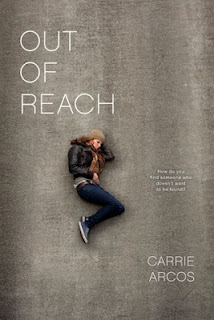First, a bit about the book:
"Seems like Leo Scott has it all: looks, brains, and athletic talent. He's captain of his high school swim team with a bright future in college and beyond. But Leo has secrets. His mother's crippling car accident has devastated his family and left Leo to deal with his father's abuse, battered and alone.
Leo's girlfriend Audrey Rose is poised for her own share of success. As one of Florida's top high school swimmers, Audrey dreams of college swimming stardom. But there's an obstacle to her glorious rise to the top. Her number-one supporter-her father-is in prison for murder.
Part murder mystery, part tale of young love in a military family, this gripping story takes readers on a journey from Pensacola to Annapolis. Leo and Audrey must band together to rise above the adversity they encounter and find their true selves in the process. When everything's on the line . . . streamline." (from Goodreads)
Thank you to Danya for inviting me to the Psychology YA Event!
As a psychologist/author (psycho author), I’m fascinated by
mental health issues, especially in the Young Adult/New Adult age group. My
high school and college psychotherapy clients are really fun to work with
because there’s so much opportunity for growth during this time of life. They
also teach me how to be hipper and more technologically advanced!
Today I’ll highlight the issue of prescription drug abuse in
teens, which is a growing problem. According to the National Institute of Drug
Abuse, every DAY 2,000 teens abuse prescription drugs. Taking these medications
without a doctor’s prescription can be dangerous, sometimes even more so than
illegal drugs. “Abuse can include taking a friend's or relative's prescription
to get high, to treat pain, or because you think it will help with studying.” (http://teens.drugabuse.gov/facts/facts_rx1.php)
I feature oxycodone addiction in my YA sports romance Streamline. Leo Scott is a 17 year-old
swimmer who faces his naval commander father’s impossible demands. When Leo
inevitably falls short, his father beats him. At first Leo tries his mother’s
Oxycontin pills to help recover from physical pain. But then he gets hooked on
the drug’s numbing effects on his emotional pain. He’s less aware of his low
self-worth and high anxiety when he steals his mother’s medication.
If you’ve ever taken prescribed pain medication and disliked
the effects as much as I have, you might wonder how an individual could become
addicted. But only a minority of users is most susceptible to getting hooked. I
heard one doctor estimate that only 10% of individuals enjoy the feeling provided by pain medication. Some risk factors
for addiction are:
* Family history of addiction (alcoholism, drug abuse).
There’s evidence we can inherit brain pathways that light up with euphoria from
alcohol or other drugs. Most people can control their use because their brains
have a more moderate response.
* History of Post Traumatic Stress Disorder. Recent research
shows that individuals with PTSD experience more physical pain and may use
substances to numb out from flashbacks. There is a high correlation between
sexual abuse and addictive behaviors.
* Poor coping skills. Negative feelings are a part of life. Buddhism’s
first Noble Truth states “Life is
difficult and painful by nature, not because we’re doing it wrong.” When we
learn how to cope with heartache effectively (e.g. talk to friends, ask for
help, write in a journal, exercise, pray, be mindful, engage in self-care) we
don’t need to numb out from negative feelings. But many of us don’t know how to
deal with the crap life throws our way. And those who have other risk factors
might succumb to drug addiction.
Streamline follows
Leo’s journey. His initial euphoria and numbing fade over time, until he’s not
using the drug to feel good, but instead to get back to baseline. Feeling
compelled, he takes the drug despite all of the negative consequences it causes.
Leo learns that Oxycontin affects the brain like heroin, and his withdrawal is
awful—like the worst flu of his life.
Can Leo discover his strengths and learn to like himself
better? Can he develop more effective skills for coping with negative emotion?
Like anyone addicted to pain medication, he has a tough road ahead of him.
Thanks very much, Jennifer, for this informative post on prescription drug abuse in teens and your book Streamline!
Jennifer has generously offered up an e-book copy of Streamline for giveaway:
To enter, please fill out THIS FORM. Comments are fabulous but do NOT count as entries.
"People fascinate the psychologist/author (psycho author) known as Jennifer Lane. Her therapy clients talk to her all day long about their dreams and secrets, and her characters tell her their stories at night. Jen delights in peeling away the layers to scrutinize their psyches and emotions. But please rest assured, dear reader, she isn’t psychoanalyzing you right now. She’s already got too many voices in her head!
Stories of redemption interest Jen the most, especially the healing power of love and empathy. She is the author of The Conduct Series—-romantic suspense for adult readers—-and is currently at work on the third and final installment: On Best Behavior. Streamline is her first foray into writing for young adults, but she’s found this sort of writing even more fun. A former college swimmer, Jen was able to put a lot of her own experiences into this book."
Thanks very much, Jennifer, for this informative post on prescription drug abuse in teens and your book Streamline!
Jennifer has generously offered up an e-book copy of Streamline for giveaway:
The rules:
- Entrants must be 13 years or older.
- Open internationally
- One entry per person
- Following and tweeting are not necessary but always appreciated!
- Ends Sept 30, at 11:59 pm EST.
- Winner will be selected randomly and contacted by e-mail
To enter, please fill out THIS FORM. Comments are fabulous but do NOT count as entries.














